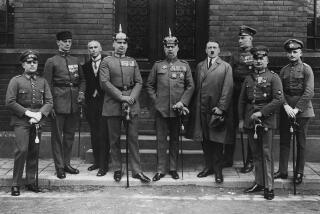Iraq Might Be Bad, but It’s No Nazi Germany
- Share via
Re “A Haunting Echo,” Opinion, Nov. 24: Shlomo Avineri’s attempt to find some similarity between the 1930s appeasement of Hitler and the current situation with Iraq falls way short. Germany was a military superpower that easily conquered most of Europe and fought the allies to a standstill for several years.
Iraq, even at the height of its military power in 1990, was a paper tiger that offered only token resistance and surrendered after a few weeks of tremendous losses. Now, after 11 years of strict sanctions and the steady destruction of its weapons by the U.N. inspectors, Iraq has an anemic 10% of its 1990 firepower. Containing Saddam Hussein has been fairly simple because his first priority is staying in power, and he knows that if he attacks any country he will be quickly crushed by a U.S.-led alliance.
The CIA rated the chances of Iraq attacking the U.S. [in the near future] as very low, unless we attack Iraq first, in which case the chances are high that terrorists will strike in the U.S. and Iraq will use the few biological or chemical weapons it might still have. Why is President Bush so intent on making this happen?
Clifford Olin
Alhambra
*
Avineri makes a convincing argument for his position, but I am not comfortable with his conclusion. Truman resisted pressure from the military to extend the Korean War into China. Kennedy resisted the goading of Gen. Curtis LeMay to attack Cuba during the missile crisis. In 1954, preventive war with the Soviet Union was seriously presented as a police option to President Eisenhower. The president replied that this “was contrary to every principle upon which our nation was founded and which it continues to profess.” These situations were much more serious than Hussein will ever be. Our presidents were not pacifists -- they had common sense. I hope Bush has common sense.
Paul Henninger
Lake Forest
*
Avineri may be right. Opponents of war with Iraq may someday be viewed as latter-day appeasers.
At the same time, fear of appeasement helped push this country into Vietnam, a war fought without the support of many of America’s allies or the approval of the United Nations. I doubt many Americans would want to repeat that mistake, either.
Alan D. Buckley
Newbury Park
*
Avineri makes the point well, but why wasn’t this the case when the president’s father, now-Vice President Dick Cheney and now-Secretary of State Colin Powell made the decision to leave Hussein in power? Why didn’t George W. Bush talk about Iraq when he campaigned for office or in the months following the election? Is it surprising that so many people suspect that this is just another attempt to use national security for political advantage?
Richard P. Young
Claremont
More to Read
Get the L.A. Times Politics newsletter
Deeply reported insights into legislation, politics and policy from Sacramento, Washington and beyond. In your inbox twice per week.
You may occasionally receive promotional content from the Los Angeles Times.










